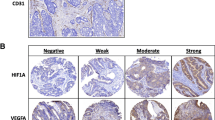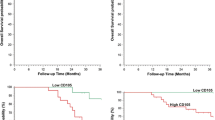Abstract
The measurement of microvessel density (MVD) is a widely accepted method for assessing the neoangiogenetic activity in neoplasia. The aim of the present study was to compare MVD with single nucleotide polymorphisms (SNPs) in the vascular endothelial growth factor receptor (VEGFR)-1 and VEGFR-2 genes and, furthermore, with quantitative measurements of the receptors in colorectal cancer (CRC) tissue. Prognosis was also assessed. Blood and tissue were collected from 110 patients surgically resected for CRC. SNPs were analysed from genomic DNA by polymerase chain reaction. MVD was assessed by immunohistochemistry using CD34 and CD105 combined with caldesmon in order to identify also immature vessels. Microvessels were counted in three fields of vision, and the mean MVD was used for statistical analysis. The VEGFR-2 1192 C/T and −604 T/C SNPs were associated with the MVD assessed by CD105. The median MVD score for the 1192 CC genotype was significantly lower compared to the CT + TT genotypes (p = 0.002). The median MVD score for the −604 CC genotype was significantly higher compared to the TT + TC genotypes (p = 0.009). A possible association, although non-significant, was demonstrated for the CD34-positive microvessels. The 1192 CC genotype and the −604 TT + TC genotypes correlated with improved survival. This is the first report on correlations between SNPs in the VEGF receptor genes and MVD in patients with CRC. Associations were shown between two SNPs in the VEGFR-2 gene and the CD105-positive microvessels indicating an impact on neoangiogenesis. Moreover, an association between the SNPs and survival was demonstrated. The clinical implications of these findings need further investigations.





Similar content being viewed by others
References
Weidner N, Semple JP, Welch WR et al (1991) Tumor angiogenesis and metastasis—correlation in invasive breast carcinoma. N Engl J Med 324:1–8
Hansen S, Grabau DA, Rose C et al (1998) Angiogenesis in breast cancer: a comparative study of the observer variability of methods for determining microvessel density. Lab Invest 78:1563–1573
Saad RS, Liu YL, Nathan G et al (2004) Endoglin (CD105) and vascular endothelial growth factor as prognostic markers in colorectal cancer. Mod Path 17:197–203
Akagi K, Ikeda Y, Sumiyoshi Y et al (2002) Estimation of angiogenesis with anti-CD105 immunostaining in the process of colorectal cancer development. Surgery 131:S109–S113
Minhajat R, Mori D, Yamasaki F et al (2006) Endoglin (CD105) expression in angiogenesis of colon cancer: analysis using tissue microarrays and comparison with other endothelial markers. Virchows Arch 448:127–134
Miller DW, Graulich W, Karges B et al (1999) Elevated expression of endoglin, a component of the TGF-beta-receptor complex, correlates with proliferation of tumor endothelial cells. Int J Cancer 81:568–572
Fonsatti E, Del VL, Altomonte M et al (2001) Endoglin: an accessory component of the TGF-beta-binding receptor-complex with diagnostic, prognostic, and bioimmunotherapeutic potential in human malignancies. J Cell Physiol 188:1–7
Fonsatti E, Sigalotti L, Arslan P et al (2003) Emerging role of endoglin (CD105) as a marker of angiogenesis with clinical potential in human malignancies. Curr Cancer Drug Targets 3:427–432
Royston D, Jackson DG (2009) Mechanisms of lymphatic metastasis in human colorectal adenocarcinoma. J Pathol 217:608–619
Takahashi Y, Kitadai Y, Bucana CD et al (1995) Expression of vascular endothelial growth factor and its receptor, KDR, correlates with vascularity, metastasis, and proliferation of human colon cancer. Cancer Res 55:3964–3968
Kaio E, Tanaka S, Kitadai Y et al (2003) Clinical significance of angiogenic factor expression at the deepest invasive site of advanced colorectal carcinoma. Oncology 64:61–73
Yonenaga Y, Mori A, Onodera H et al (2003) Absence of smooth muscle actin-positive pericyte coverage of tumor vessels correlates with hematogenous metastasis and prognosis of colorectal cancer patients. Oncology 69:159–166
Rajaganeshan R, Prasad R, Guillou PJ et al (2007) The influence of invasive growth pattern and microvessel density on prognosis in colorectal cancer and colorectal liver metastases. Br J Cancer 96:1112–1117
Des GG, Uzzan B, Nicolas P et al (2006) Microvessel density and VEGF expression are prognostic factors in colorectal cancer. Meta-analysis of the literature. Br J Cancer 94:1823–1832
Romani AA, Borghetti AF, Del RP et al (2006) The risk of developing metastatic disease in colorectal cancer is related to CD105-positive vessel count. J Surg Oncol 93:446–455
Li C, Gardy R, Seon BK et al (2003) Both high intratumoral microvessel density determined using CD105 antibody and elevated plasma levels of CD105 in colorectal cancer patients correlate with poor prognosis. Br J Cancer 88:1424–1431
Xiong B, Sun TJ, Yuan HY et al (2003) Cyclooxygenase-2 expression and angiogenesis in colorectal cancer. World J Gastroenterol 9:1237–1240
Cheng J, Slavin RE, Gallagher JA et al (2004) Expression of vascular endothelial growth factor and receptor flk-1 in colon cancer liver metastases. J Hepatobiliary Pancreat Surg 11:164–170
Nakasaki T, Wada H, Shigemori C et al (2002) Expression of tissue factor and vascular endothelial growth factor is associated with angiogenesis in colorectal cancer. Am J Hematol 69:247–254
Kim JG, Chae YS, Sohn SK et al (2008) Vascular endothelial growth factor gene polymorphisms associated with prognosis for patients with colorectal cancer. Clin Cancer Res 14:62–66
Schneider BP, Radovich M, Sledge GW et al (2008) Association of polymorphisms of angiogenesis genes with breast cancer. Breast Cancer Res Treat 111:157–163
Fox SB, Leek RD, Smith K et al (1994) Tumor angiogenesis in node-negative breast carcinomas—relationship with epidermal growth factor receptor, estrogen receptor, and survival. Breast Cancer Res Treat 29:109–116
Perrone G, Vincenzi B, Santini D et al (2004) Correlation of p53 and bcl-2 expression with vascular endothelial growth factor (VEGF), microvessel density (MVD) and clinico-pathological features in colon cancer. Cancer Lett 208:227–234
Yu JX, Cui L, Zhang QY et al (2006) Expression of NOS and HIF-1alpha in human colorectal carcinoma and implication in tumor angiogenesis. World J Gastroenterol 12:4660–4664
Yu JX, Zhang XT, Liao YQ et al (2003) Relationship between expression of CD105 and growth factors in malignant tumors of gastrointestinal tract and its significance. World J Gastroenterol 9:2866–2869
Schneider BP, Wang M, Radovich M et al (2008) Association of vascular endothelial growth factor and vascular endothelial growth factor receptor-2 genetic polymorphisms with outcome in a trial of paclitaxel compared with paclitaxel plus bevacizumab in advanced breast cancer: ECOG 2100. J Clin Oncol 26:4672–4678
Bossi P, Viale G, Lee AK et al (1995) Angiogenesis in colorectal tumors: microvessel quantitation in adenomas and carcinomas with clinicopathological correlations. Cancer Res 55:5049–5053
Gonzalez FJ, Vicioso L, Alvarez M et al (2007) Association between VEGF expression in tumour-associated macrophages and elevated serum VEGF levels in primary colorectal cancer patients. Cancer Biomark 3:325–333
Hlatky L, Hahnfeldt P, Folkman J (2002) Clinical application of antiangiogenic therapy: microvessel density, what it does and doesn’t tell us. J Natl Cancer Inst 94:883–893
Vermeulen PB, Gasparini G, Fox SB et al (2002) Second international consensus on the methodology and criteria of evaluation of angiogenesis quantification in solid human tumours. Eur J Cancer 38:1564–1579
Acknowledgements
We are very thankful for the technical assistance provided by Lone Frischknecht, Lone Hartmann Hansen, Sara Egsgaard, Birgit Roed Sørensen and Karin Larsen. The study was supported by The Cancer Foundation.
Conflict of interest
None.
Author information
Authors and Affiliations
Corresponding author
Additional information
Support: The Cancer Foundation
Rights and permissions
About this article
Cite this article
Hansen, T.F., Sørensen, F.B., Spindler, KL.G. et al. Microvessel density and the association with single nucleotide polymorphisms of the vascular endothelial growth factor receptor 2 in patients with colorectal cancer. Virchows Arch 456, 251–260 (2010). https://doi.org/10.1007/s00428-009-0878-8
Received:
Revised:
Accepted:
Published:
Issue Date:
DOI: https://doi.org/10.1007/s00428-009-0878-8




